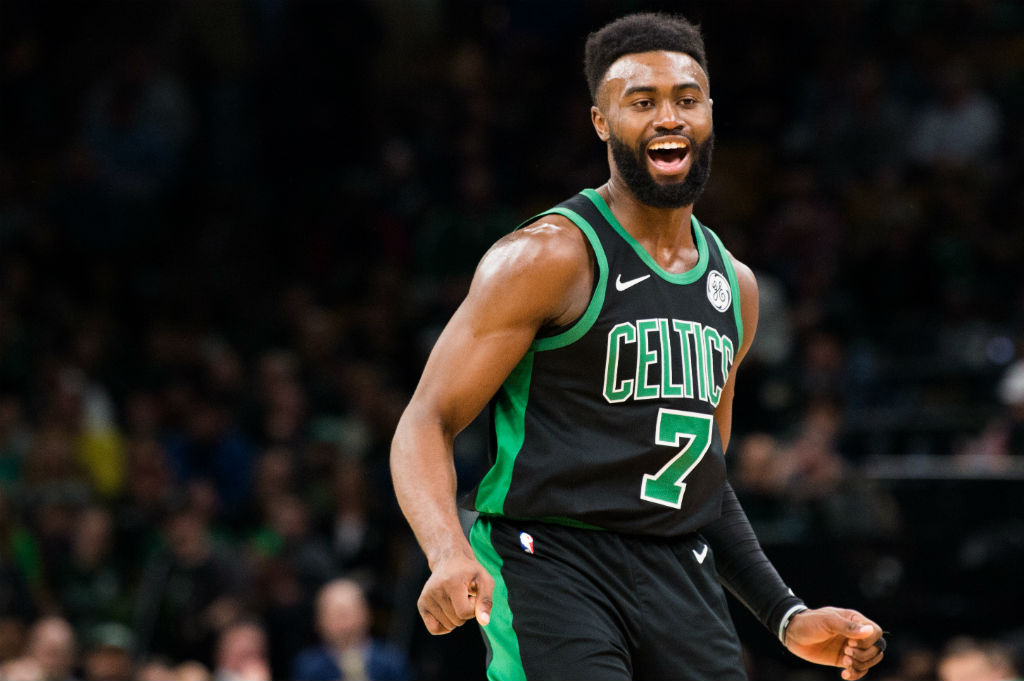Three members of the 2016 NBA Draft class have, thus far, agreed to rookie extensions with their teams: Ben Simmons and Jamal Murray at the five-year $170 million max, and Caris LeVert at a more team-friendly $52.5 million over three years.
That leaves 18 additional players eligible for rookie extensions before the Oct. 21 deadline. One player who doesn’t appear likely to receive such an extension is Jaylen Brown of the Boston Celtics, per a report from Sean Deveney of Heavy.com. Deveney’s league source says “the chance is pretty slim” that the Celtics and the No. 3 overall pick from the 2016 NBA Draft can agree to a deal before the start of the regular season.
This makes sense for Brown. He probably values himself in a similar range as Simmons and Murray, given that he has had more playoff success than either player and was a capable starter in his second season before seeing his role change last year. If extension talks were being held after the 2017-18 season, Brown would be a shoo-in for a maximum contract — consider that Zach Lowe posited that Boston should have pause about including Brown in trade talks for Kawhi Leonard.
A year later, Brown’s outlook isn’t as rosy. He started 25 games for the Celtics in 2018-19, who were overwhelmed with wings following Gordon Hayward’s return to the squad. Brown stagnated in his growth on the offensive end; his usage rate increased, but so did his turnovers without a corresponding increase in assists. The Celtics were 6.8 points per 100 possessions better with him off the floor, per Cleaning the Glass. It was a drastic turnaround from the year before, when Brown’s presence was worth 8.8 points per 100 possessions.
The question of whether or not the Celtics should give Brown a major extension depends on the answer to another question: Is Brown’s 2017-18 or 2018-19 campaign more indicative of what he is and what he can be?
If Boston is uncertain of what Brown projects to be, the team could use another season of data to assess if he belongs in the tier of quality rotation players, or beyond that as a projected All-Star. Brown is only entering his age-23 season, so he is far from his prime. And this year, he’ll have a chance to grow alongside what projects to be the Celtics core moving forward: Kemba Walker, Marcus Smart, and Jayson Tatum.

In that sense, this outcome works best for Brown. Rather than be judged off a season that he believes is not representative of what he will become, he can demonstrate his worth on a team with presumably better chemistry where he should receive more playing time and a larger role. Unfortunately, his first opportunity to do that with Team USA wasn’t quite conclusive. He was dazzling in brief moments, but most definitely did not pop like a max-level star. If Brown can’t command maximum money at this point, it really isn’t in his best interest to agree to a below-market extension.
From Boston’s perspective, Deveney noted that the team generally has not agreed to extensions with their young players before hitting restricted free agency. In the past, that may have been a function of the players have low cap holds given that they were drafted in the late lottery and beyond. Waiting until restricted free agency to sign new contracts was a method for the Celtics to create extra cap space before retaining their players.
Brown, however, was the third overall pick and thus carries a $19.6 million cap hold into next offseason. As a result, Boston isn’t really gaining an advantage by delaying his next contract. If anything, the Celtics could probably negotiate a discount this summer given Brown’s current value relative to what it could be in one year. A four-year, $80 million deal would start just below Brown’s cap hold, and seems about the right valuation for a defense-first wing who can occasionally hit shots from distance.
Given the dearth of quality free agents on the market next summer, Brown could command a hefty offer sheet from a rebuilding team who could use a 24-year-old wing, even with his limitations. Think about what happened to Washington with Otto Porter in 2017, and he’s a better shooter than Brown. A team like Memphis or Atlanta could easily slot Brown into their young core, even if they have to overpay. That means Boston could have to match a larger contract, one that restricts the team’s flexibility moving forward, or risk losing Brown altogether.
The Celtics still have enough wings to the point where Brown might not be a starter this season. They could run a lineup of Walker, Smart, Tatum, Hayward, and Enes Kanter, and continue to deflate Brown’s value by bringing him off the bench. But that doesn’t seem like the way to endear a young player to the franchise, particularly after a season in which the team was surrounded by, as Kanter described it, “negative energy.” Then again, if Hayward returns to his All-Star form Utah, it’s hard to argue that he doesn’t deserve to start over Brown.
A year ago, the Celtics had a clear-cut future centered around Kyrie Irving and their young cadre of shiny wings. Now, the path forward is a little less clear, and Jaylen Brown’s contract status is emblematic of that uncertainty. The Celtics might be wise strike now to sign Brown before the vultures come knocking next summer. It may not be their usual method of doing business, but nothing has really gone according to plan in Boston over the last year.







